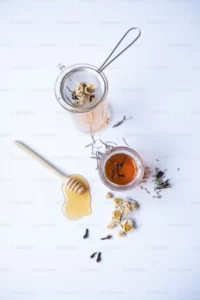Table of Contents
For thousands of years, people have recognized the health and wellness benefits of honey. Ancient civilizations like the Egyptians and Mesopotamians used medicinal honey for its antibiotic and antimicrobial properties. Honey was valued for wound and burn care, and it was even used in the preservation of bodies after death. The interest in using honey for human health benefits has recently increased, with applications ranging from wound care to treating gastrointestinal disorders and metabolic diseases like diabetes and hypertension. Ongoing research continues to explore the many uses of honey in medicine, and the FDA has approved its use in certain medical settings.
The veterinary world has also taken notice of the health and healing benefits of honey, particularly a type called manuka honey, which has shown positive effects for both dogs and humans.
What is Manuka Honey?
Manuka honey is derived from the nectar of the manuka (or ‘tea’) tree, found in Australia and New Zealand. This type of honey is known for its high antioxidant content, powerful antibiotic properties, and strong anti-inflammatory effects. Due to its natural composition, it can be challenging to determine the exact composition of manuka honey. To ensure its quality, producers use two rating scales to indicate the honey’s purity. One scale measures the amount of methylglyoxal (MGO), a compound that gives manuka honey its impressive antibiotic properties. The other scale measures the unique manuka factor, known as UMF, which takes into account various chemical compounds in the honey. Higher MGO and UMF ratings indicate a more potent antibiotic effect.
How Can Manuka Honey be Used?
Manuka honey has various applications for improving a dog’s overall health. It can be applied topically to aid in the healing of minor wounds or infections. Veterinarians may also incorporate manuka honey into treatment plans for more significant or serious wounds. Additionally, small amounts of manuka honey can be ingested by dogs to help with allergies and inflammation.
However, there are specific cases where dogs should not consume honey. Puppies under the age of 1 and dogs with compromised immune systems should avoid honey due to the risk of botulism spores. Obese or diabetic dogs should also refrain from consuming honey due to its high sugar content. Lastly, dogs allergic to bee stings should not be given honey.
Manuka Honey for Wound Care
One of the most notable uses of honey for dogs and humans is wound cleaning and healing. Most types of honey contain hydrogen peroxide, which contributes to its antibacterial properties. However, manuka honey is considered a ‘non-peroxide’ honey and is up to 100 times more effective as an antibacterial agent than other honeys due to its high concentration of the antibiotic methylglyoxal (MGO). Unlike repeated use of hydrogen peroxide, manuka honey’s antibiotic properties do not harm skin tissue.
The high sugar content of manuka honey also has an osmotic effect, drawing moisture out of wounds. This reduces swelling and helps dry out and kill bacteria in the wound. Additionally, the slight acidity of honey creates an environment where bacteria cannot survive, promoting healing and tissue regeneration.
With the rise of antibiotic-resistant bacteria, manuka honey offers an effective solution. Even drug-resistant bacteria can be killed by manuka honey, and its complex composition makes it difficult for bacteria to develop resistance.
To apply manuka honey to a dog’s wound, it should be covered with a non-stick dressing or used in conjunction with a cone to prevent the dog from licking it off before it can take effect. Manuka honey can also be mixed with a saline solution and used as a wound wash.
Manuka Honey for Skin Irritation
Manuka honey possesses natural anti-inflammatory properties, making it useful for soothing skin irritations. It can be applied topically as a balm or taken orally to alleviate redness and itching caused by allergies.
Manuka Honey for Immune Health
The high levels of antioxidants found in manuka honey can boost a dog’s overall immune system, providing protection against illness and disease. Antioxidants play a crucial role in maintaining molecular and cell health, supporting the body’s natural defense mechanisms.
Manuka Honey for Digestive Health
Manuka honey contains essential prebiotics and probiotics, which contribute to maintaining good digestive health in dogs. These components help balance the dog’s gut biome and aid in digestion. Additionally, honey can reduce inflammation in the intestines caused by food allergies or inflammatory bowel disease. Adding manuka honey to a dog’s food can provide these digestive benefits. However, it’s important to note that manuka honey can cause digestive upset in some dogs, especially those with sensitive stomachs. If unsure about whether manuka honey is suitable for a dog, it’s best to consult with a veterinarian before introducing it to their diet.
The antibacterial properties of manuka honey can also improve a dog’s oral health. By reducing harmful bacteria in the mouth, the risk of tooth decay and gum disease is minimized. While manuka honey can be a beneficial supplement to a dog’s oral routine, it should not replace regular teeth cleaning.
The Bottom Line
Manuka honey has been recognized for its health and healing benefits for thousands of years and remains a valuable part of a dog’s health and wellness toolkit. With its anti-inflammatory, antibiotic, and antimicrobial properties, manuka honey is a powerful aid in first aid and overall wellness. When giving dogs oral honey, it’s important to introduce it slowly to gauge their tolerance, as excessive sugar consumption can lead to dental problems or hyperactivity. As with any over-the-counter product, it’s always recommended to consult with a veterinarian if there are any health concerns regarding a dog.



